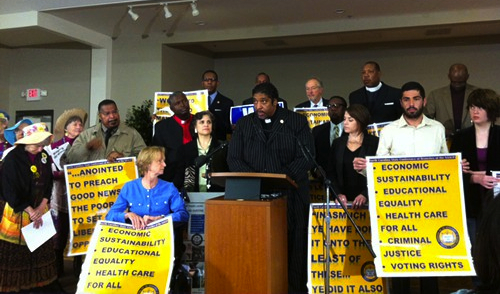Faith leaders from across the state and from different traditions continue to speak out in support of Moral Mondays, the weekly NC NAACP-led demonstrations in Raleigh.
Within days of each other, the heads of Episcopal, Lutheran, Presbyterian, Roman Catholic and United Methodist judicatories in North Carolina and seven Jewish leaders in the Triangle issued statements of support based on their religious convictions.
The first letter read in part:
The Rev. Dr. Rodney Sadler of Union Seminary (Charlotte) recently summarized the effect of pending and enacted legislation especially on the poor, the aging and children.
As you read this letter, the North Carolina General Assembly is passing bills that will remove 500,000 people from the Medicaid roles leaving them without health insurance; that will remove 170,000 people from unemployment when unemployment rates remain at historically high levels; that threaten to replace the graduated state income tax with a consumption tax that will adversely impact the poorest North Carolinians who will face increased prices on basic goods; that will force college students to return to their often distant homes to vote or cost their parents their $2,500 dependency deduction…. These and many other bills will adversely impact those who can least afford it and therefore demand a fervent response from people of faith!
Our concern about the legislative actions cited by Rev. Dr. Sadler is not an act of political partisanship. Rather it is a matter of faith with respect to our understanding of the biblical teachings and imperatives to protect the poor, respect the stranger, care for widows and children and love our neighbors (Isaiah 10:1-2, Hebrews 13:2, James 1:27, Matthew 22:39, Galatians 5:14). We recognize and respect other Christian brothers and sisters who may seek to apply these biblical teachings in different ways and through different means.
It was signed by:
- The Right Reverend Michael Bruce Curry, Bishop, Episcopal Diocese of North Carolina
- Tthe Reverend Dr. Leonard Bolick, Bishop, Synod of North Carolina, Evangelical Lutheran Church in America
- The Reverend Ted Churn, Executive Presbyter, Presbytery of New Hope, Presbyterian Church (USA)
- The Most Reverend Michael F. Burbidge, Bishop, Catholic Diocese of Raleigh
- Bishop Hope Morgan Ward, North Carolina Conference, United Methodist Church
- Bishop Larry Goodpaster, Western North Carolina Conference, United Methodist Church
- The Right Reverend Alfred “Chip” Marble, Assisting Bishop, Episcopal Diocese of North Carolina
- The Reverend Anne Hodges-Copple, Bishop Suffragan-elect, Episcopal Diocese of North Carolina
- The Right Reverend Porter Taylor, Bishop, Episcopal Diocese of Western North Carolina
- The Reverend Betty Meadows, Transitional Executive Presbyter, Presbytery of Charlotte, Presbyterian Church (USA)
Citing Exodus and Deuteronomy, the letter from Jewish leaders read in part:
It is our view that the current General Assembly has failed in its pursuit of justice. It has purposelessly prevented 500,000 North Carolinians from obtaining health care; slashed education funding for the poorest children in the state; proposed a tax policy that will further burden poor families, while offering tax breaks to the wealthy; singled out immigrants for special legal harassment; and attempted to restrict the voting rights of thousands of North Carolinians.
Many of us have previously attempted to reach out to Assembly leaders for dialogue, and we have been ignored. We therefore endorse the use of nonviolent civil disobedience to draw attention to the reckless and heartless policies currently passing into law in Raleigh. We sign this letter as individuals, not on behalf of our congregations.
It was signed by:
- Rabbi Lucy Dinner, Temple Beth Or, Raleigh
- Rabbi Ariel Edery, Temple Beth Shalom, Cary
- Rabbi Jen Feldman, Kehillah Synagogue, Chapel Hill
- Rabbi Frank Fischer, Chapel Hill
- Rabbi John Friedman, Judea Reform Congregation, Durham
- Rabbi Raachel Jurovics, Yavneh, Raleigh
- Rabbi Eric Solomon, Beth Meyer Synagogue, Raleigh
Both letters in their entirety can be read here.
–Aleta Payne, Development and Communications

